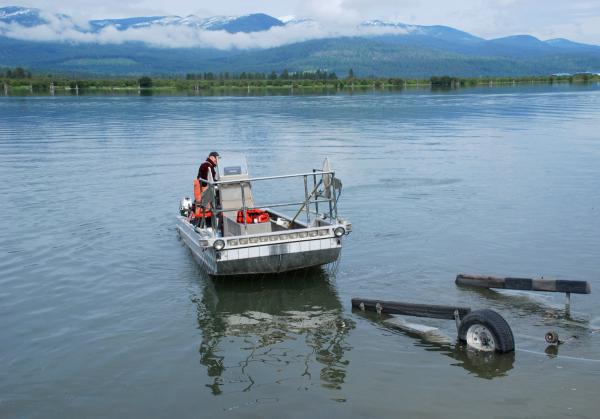
The Pend Oreille River, near Kalispel tribal offices, supplied salmon and steelhead to Native people but that ended when Grand Coulee Dam was built.
Jack McNeel
ICTMN 12/10/13
Will fish passage be restored from the Columbia River to Canada? Will a 15-tribe coalition significantly influence an international treaty that will last a lifetime? Can Canada and the U.S. agree to financial impacts affecting each country? Will ecological concerns get equal consideration with electric power rates?
These questions are part of the Columbia River Treaty recommendation that is due to go to the U.S. State Department in mid-December. Congress won’t be making any decisions at this point, in fact 2014 is the first year either Canada or the U.S. can notify the other whether to eliminate the treaty, retain it as is, or to modify it. Even then there is a 10-year clock for both countries to analyze and prepare for international negotiation. Despite that time lag, the next few months should decide the U.S. position on these critical questions, many of which effect Native people on both sides of the border.
The original treaty, ratified in 1964, had two primary purposes of flood control and hydropower but tribes had virtually no say in the development of the treaty. Much has changed in the past 50 years. One significant change is the many years of experience tribes now have in international treaty work, especially regarding the Pacific Salmon Treaty. Fifteen of the northwestern tribes have now formed a coalition to work together in obtaining considerations of importance to them in a future long-term treaty.
Joel Moffitt, Nez Perce and Chairman of the Columbia River Inter-Tribal Fish Commission, spoke before the Senate’s Committee on Energy and Natural Resources on November 7, first pointing out the Columbia Basin Tribes are working with the U.S. Entity and other sovereigns and do not have their own alternative technical or draft proposals as might have been suggested by others.
Moffitt summarized what the Columbia Basin Tribes see as critical elements: Integrate ecosystem-based function as a third purpose equal to hydropower and flood risk management; Enhance spring and summer flows while stabilizing reservoir operations; Pursue restoration of fish passage to historic locations; Pursue with Canada post-2024 operations to meet flood risk management objectives, and finally, and important to power interests, balance the annual payment to Canada known as Canadian Entitlement.
He explained the impacts to “Columbia Basin Tribes, First Nations and other communities all the way up to the headwaters,” began with the construction of dams even before the present treaty. “The tribes have also been excluded from its governance and implementation. The Treaty does not include considerations of critical tribal cultural resources.” He went on to add, “The tribes believe that a modernized Treaty needs to address the Columbia Basin using a watershed approach that integrates ecosystem-based function, hydropower, and flood risk management on both sides of the border.”
Moffitt explained that this approach, among other things, should increase recognition and preservation of tribal first foods, increase salmon survival, increase resident fish and wildlife survival, and allow fish passage to historical habitats now blocked.
Matt Wynne, tribal secretary for the Spokane Tribe and a member of the 15-tribe coalition, commented, “The part that the Spokane Tribe is really interested in seeing to fruition is at least a study on anadromous fish passage above Grand Coulee Dam.”
Wynne added that he was happy with the overall draft recommendation. “It looks a lot more for Indian country than it ever has before. This was a really good move in a positive direction with the 15 basin tribes coming together and working together to have the ecosystem-based function as an element of the treaty. I’m really proud of how the 15 tribes have worked together.”
The public was introduced to the draft recommendation earlier this year and were encouraged to comment. Time has now expired for public comment but those comments were considered by the Sovereign Review Team in developing the regional draft which is going to the State Department.
The major conflict within the region is between the “power group” with the single focus of trying to reduce power rates for Pacific Northwest rate payers and the tribes and conservation groups who advocate an equitable role for eco-based functions which include fish passage to Canada. While the recommendation is near completion there is still a power struggle to better reflect the work of the region as opposed to the single focus of the power group.
Washington State’s Democratic Senator Maria Cantwell sits in a very pivotal seat at a pivotal moment. She chairs the Senate Committee on Indian Affairs and is no doubt being lobbied hard by both groups. With 15 U.S. tribes involved and similar numbers of First Nations bands in British Columbia, Indian country has much at stake.
